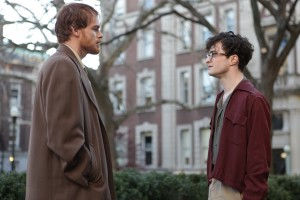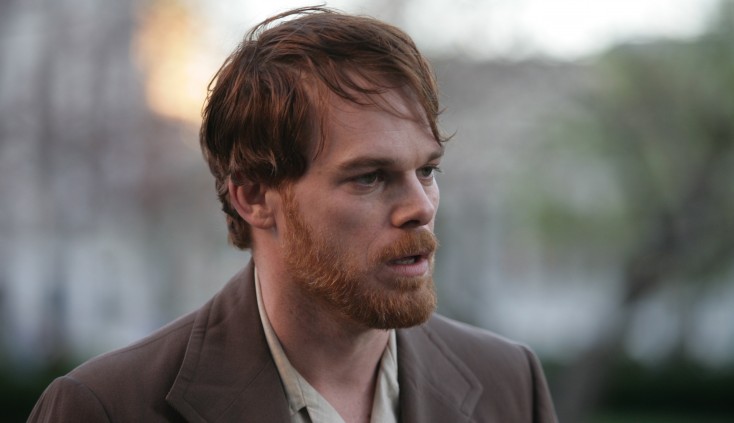
Left to right: Michael C. Hall as David Kammerer and Daniel Radcliffe as Allen Ginsberg in “Kill Your Darlings.” ©Sony PIctures Classics. CR: Jessica Miglio.
By ANGELA DAWSON
Front Row Features
HOLLYWOOD—“I’m certainly drawn to things that in one way or another could be characterized as subversive,” says actor Michael C. Hall in his deep, monotone voice.
Hall, of course, is best known for his Emmy-nominated roles in “Dexter” and “Six Feet Under,” in which he played a sociopathic serial killer and an uptight undertaker, respectively.
Having recently completed the eighth and final season of “Dexter,” Hall is now focusing on his film career and returning to his first love—the stage.
He has just completed work on a documentary about global warming which took him to Bangladesh. He returned to L.A. the night before an interview so he is suffering a bit of jet lag. Ever the trouper, he is promoting “Kill Your Darlings,” a drama based on the early lives of writers Allen Ginsberg, William Burroughs and Jack Kerouac, and an incident that changed their lives. Hall plays David Kammerer, a member of Ginsberg’s inner circle, who was jealous of the young poet (played by “Harry Potter’s” Daniel Radcliffe over another man, Lucien Carr (Dane DeHaan), that they were both romantically drawn to.
Kammerer is the first real person Hall has depicted on film and he wanted to do justice to the complex character that figured prominently in Ginsberg’s evolution while attending Columbia University in the 1940s. He spoke about the Beats and writing the next chapter of his own life.
Q: Where do you see yourself heading next?
Hall: I would like to do more film, certainly. After making these two open-ended commitments (“Six Feet Under” and “Dexter”) to characters that took me through five and then eight years of my life, subsequently, I’m interested in doing things that have a definitive beginning, middle and end, and mixing it up a bit more. I learned after “Six Feet Under,” never say never because I said I never wanted to do another television series and then “Dexter” came along. That said, I’m interested in mixing it up a bit more so that probably means more films and stage. Now that my calendar’s freed up, I’d like to take advantage of opportunities there as well.
Q: Anything set in stone?
Hall: There’s a (Will Eno) play called “The Realistic Joneses,” on Broadway that I’m going to start rehearsing in January.
Q: Who’s directing?
Hall: Sam Gold. It would open sometime in March and run through early summer.
Q: Are you just taking it easy now?
Hall: Well, when “Dexter” ended I immediately went and shot a film in upstate New York called “Cold in July” that Jim Mickle directed. He did “We Are What We Are” recently. And then I went to Bangladesh and just got back yesterday. I have pretty severe jet lag. If I seem like I’m on drugs, that’s why.
Q: Bangladesh?
Hall: I participated in this documentary on climate change. I’m there not in a hard news way but as a correspondent. They have a number of stories that they’re doing all over the world. It’s a series. And I did that one. It’s produced by some independent producers through Showtime. That’s how I got involved. So I actually haven’t taken any time off yet though I look to be pretty free and clear until after the holidays. I’m looking forward to catching my breath a little bit.
Q: Is climate change an important issue for you?
Hall: I think it’s the important issue. It affects everything else. And these people (in Bangladesh) are living in a place that’s destined to be underwater. It’s not a theoretical issue for them.
Q: You play a complex, conniving character in “Kill Your Darlings.” What was it that really resonated when you read the script and was there anything that surprised you about David when researched the role?
Hall: I was aware of this story and went through my period of fascination with the Beats and was excited that it was being told and especially that it was being told as well as it was with John (Krokidas, the director) and Austin (Bunn’s) script. I was excited, more specifically about the opportunity to humanize and sympathize with this guy who is sort of a footnote in a lot of the accounts of the formative years of the Beat Generation. He was, if anything, characterized as a bit of a two-dimensional villain/stalker. I liked that the movie seemed to aspire to round him out a bit.
Q: How did making this film fit into your “Dexter” schedule?
Hall: It coincided with the hiatus of the sixth and seventh season. It was exhilarating to encounter a new character—someone who’d really lived and was more than just an idea.
Q: Why did you want to do it?
Hall: Generally, the idea of the film was appealing to me because I’m familiar with these guys (the Beats). I knew about the story. I always was amazed that it had never been told. I was excited at how well told it was. The specific reason, initially, was the script. It had a freshness. I don’t think it’s really a biopic because it doesn’t span anyone’s lifetime. It’s a specific period of time. It was nuanced and carefully crafted, and the characters were so well drawn. I sort of liked the fact that this sort of shadow figure was given a voice too. Obviously, his behavior is suspicious in terms of the nature of it. But in terms of motives go, I think he was lovesick, not someone who was twisting his mustache. That excited me.
Q: Were you able to do much research on him? Was there a lot out there?
Hall: There is relatively little, but there was enough in “The Book of Martyrdom and Artifice” that was Allen Ginsberg’s journal. There were some real time accounts of his first meeting with David Kammerer. There was enough that I could make informed choices as I filled in the blanks. There was some research, but it was an imaginative exercise too.
Q: The beat poets and generation have such a staying power, they’ve been around for 50-plus years. Every generation relates to it. When you were younger, did you have some angsty writing that you put down that just kind of either reflected this kind of feeling that these guys wrote about? Why do you think they have such staying power?
Hall: I think we’re still feeling the ripple effects of the cultural phenomenon or revolution that they perhaps started. I think our fascination with their work does coincide with a period when you’re coming into awareness in the ways of which whatever conventions there are might constrain you. It speaks to that awareness and appetite to break those boundaries or chains. I definitely have some journal entries that are characterized by run-on sentences. I definitely tried to emulate what they had inspired in me.
Q: Is there any difference in playing people who are in that period versus playing people who are contemporary?
Hall: Yeah. I think especially with the job that our wardrobe people did and the script is so well rendered that a lot of it could be unconscious. You could just give over to living in a world that is contextualized in a totally different way and everybody has different things that are useful, whether it’s listening to music or putting on the clothes or what have you.
Q: Are there added challenges as an actor in portraying a real person?
Hall: It’s fun to have some real things to hold onto. It makes it, to some degree, a different exercise to play a real person. I certainly think, whether it’s purely fictional or based on a real person, judgment must be withheld or not exist in the first place if you’re going to do it. In the case of David Kammerer, I certainly didn’t think of him as a stalker; I thought of him as someone who was in love with the wrong person and couldn’t let it go.
Q: What was your most difficult scene to do?
Hall: The water in the Hudson River was pretty cold. It’s really hard to single anything out. Just tolerating being in a place of such unfulfilled passion, that’s a challenging place to live and tolerate.
Q: Did it give you an excuse to re-read the works that maybe you hadn’t read since you were a teenager?
Hall: It did. And it allowed me to revisit a time where I was initially captivated by it, when I was the age of these guys. Not David, but the younger guys. That was fun. You know, we look at this stuff in hindsight we don’t appreciate how beyond the margins and outside the box these guys were not just thinking, but also living. A counter-cultural sensibility is a legitimate option now, not a brand new way of thinking and being. It was nice considering the time that these guys were living and thinking this way. It really gave me a new respect for what they were all about.





